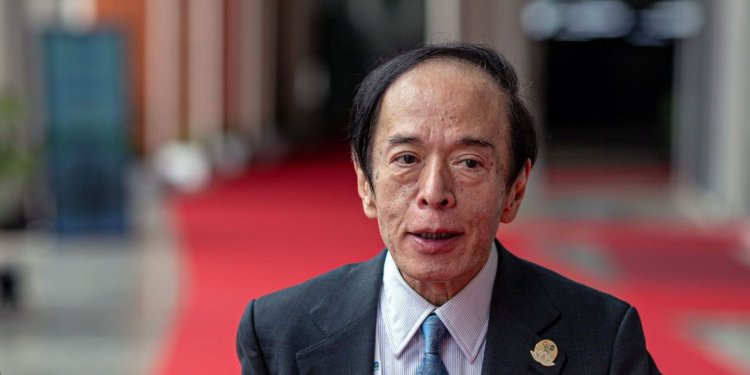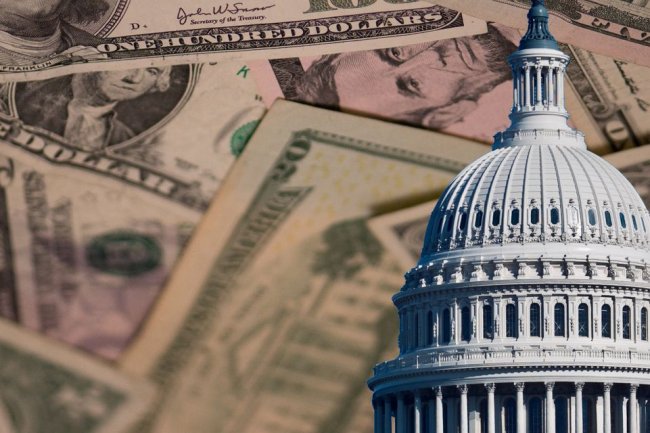Bank of Japan Hints It Will Accept Higher Rates, Lifting Bond Yields
Central bank calls cap on government bond yields a reference point, not rigid limit BOJ Gov. Kazuo Ueda has said the bank would refrain from making any premature rate increases. Photo: Dhiraj Singh/Bloomberg News By Megumi Fujikawa Updated July 28, 2023 2:57 am ET TOKYO—Japanese government bond yields surged and Tokyo stocks wobbled after the Bank of Japan indicated it would tolerate higher interest rates as inflation picks up. The BOJ said Friday it would consider its 0.5% cap on the 10-year government bond yield as a suggestion, not a rigid limit. The central bank’s announcement briefly drove the yield on the 10-year bond to 0.575%, the highest level since September 2014, before it fell back to 0.54%. The yield had stood at 0.44% late Thursday. The yen rose as investors tr


BOJ Gov. Kazuo Ueda has said the bank would refrain from making any premature rate increases.
Photo: Dhiraj Singh/Bloomberg News
TOKYO—Japanese government bond yields surged and Tokyo stocks wobbled after the Bank of Japan indicated it would tolerate higher interest rates as inflation picks up.
The BOJ said Friday it would consider its 0.5% cap on the 10-year government bond yield as a suggestion, not a rigid limit.
The central bank’s announcement briefly drove the yield on the 10-year bond to 0.575%, the highest level since September 2014, before it fell back to 0.54%. The yield had stood at 0.44% late Thursday.
The yen rose as investors treated the move as a de-facto interest-rate increase. The Nikkei Stock Average at one point fell more than 2% before regaining most of its lost ground to finish down 0.4%. Bank shares surged because higher government bond yields mean they can charge higher interest rates on commercial loans and earn better yields from bonds and other investments.
Officially the Bank of Japan didn’t change any rates. It kept short-term interest rates unchanged at minus 0.1%.
However, it added new language about the 0.5% cap on the 10-year government bond. The central bank said it would regard the cap and a corresponding lower bound of minus 0.5% “as references, not as rigid limits, in its market operations.”
The bank also said it would purchase Japanese government bonds at a 1% yield every business day, which effectively sets a new hard cap for the 10-year yield at 1%.
“It is virtually the same as raising the cap for the 10-year JGB yield target to 1%,” said Naomi Muguruma, a strategist at Mitsubishi UFJ Morgan Stanley Securities. She said the market was now closely watching at what level the Bank of Japan would intervene to stop yield rises.
Muguruma said she didn’t think the BOJ’s policy adjustment would hurt stocks. “Interest rates are still very low in Japan among advanced economies,” she said.
The Federal Reserve and the European Central Bank both further raised their benchmark interest rates this week.
Many investors had expected the Bank of Japan to formally lift its 10-year bond yield cap or scrap it altogether. Commercial banks have said it is hard to make profits when both short-term and long-term rates are kept near zero.
Consumer-price growth has stayed above the bank’s 2% target for more than a year owing mainly to the higher cost of imported energy and food.
The Bank of Japan said inflation expectations were rising and the inflation rate was higher than projected in April. It suggested that this allowed for more flexibility in setting the government-bond yield cap.
However, BOJ Gov. Kazuo Ueda has said the bank would refrain from making any premature rate increases in hopes of ensuring that Japan doesn’t return to the near-zero inflation or deflation it has experienced for most of the past quarter-century.
Friday’s decision wasn’t unanimous. Policy board member Toyoaki Nakamura dissented, suggesting he was uneasy about taking a step that could hit corporate earnings until more data were available.
Higher interest rates tend to lift the yen, and a higher yen tends to reduce the profits of Japanese exporters. Nakamura previously worked at electronics maker Hitachi.
The yen initially rose on the Bank of Japan news but gave back much of its gains. It was trading at around 139.60 to the dollar on Friday afternoon in Tokyo, stronger than around 140-141 yen to the dollar earlier in the week.
In its quarterly outlook released Friday, the bank’s policy board said core consumer prices excluding fresh food would likely increase 2.5% in the current fiscal year ending March 2024 and 1.9% the following year. It said core consumer prices would rise 1.6% in the year ending March 2026, falling back below the bank’s 2% target.
—Kosaku Narioka contributed to this article.
Write to Megumi Fujikawa at [email protected]
What's Your Reaction?













